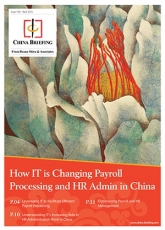China’s Work-related Injury Insurance Scheme – Empowering Employees and Employers Alike
 By Dezan Shira & Associates
By Dezan Shira & Associates
Editor: Mia Yiqiao Jing
Clarifying what constitutes a work-related injury has always been a difficult task for both employees and employers to claim legal rights. In China, problems usually arise from the time and location at which incidents occur, and to what extent they are related to work tasks, making legal processes rather complex for foreign employers and insurance agencies.
Occupational injuries and diseases, post-work death, and industrial accidents have generated the most number of law disputes regarding work-related injuries. Since much-publicized cases of Karoshi (death from overwork) at Dell in 2005 and at PwC in 2011, foreign organizations operating in China have been questioned on their abilities to protect employees from overwhelming workloads and to maintain sustainable development, an increasingly hot topic as China expands opportunities for foreign-invested enterprises to operate in the country.
In this article, we brief China’s regulation on work-related injury insurance with a comprehensive guide on conditions for qualification, benefit items, and suggestions for foreign organizations in China to minimize the risk of work-related injuries and law disputes.
China’s Regulation on Work-related Injury Insurance
In China, the Regulation on Work-related Injury Insurance applies to all workers under the employment of enterprises, institutions, social organizations, private non-enterprise organizations, funds, law firms, accounting firms, and individually-owned businesses. It ensures that employees or their families receive efficient medical treatment and adequate economic compensation in case of work-related injuries or death. Promulgated by the Social Security Administrative Department of the State Council, the insurance premium is contributed by employers, and the rate is determined based on the risk of work injuries in different types of industries.
Determination of Work-related Injuries
Since the promulgation of revised regulations in 2011 governing work-related injuries, the Chinese government has expanded their scope to include incidents occurring outside of work premises, such as while commuting and travelling for work reasons under specific circumstances. Employees who contract occupational illnesses, accidentally injure themselves, or die on-site while performing or conducting preparatory work, or within 48 hours after work hours, all fall into the scheme of work-related injury insurance beneficiaries.
![]() RELATED: Payroll and Human Resource Services
RELATED: Payroll and Human Resource Services
Benefits for Employees under Work-related Injury Insurance
Medical benefits
Employees undergoing medical treatments, including clinical procedures, pharmaceutical care, and hospitalization required for work-related injuries, are eligible to have the corresponding expenses covered by the work injury insurance fund.
Since work-related injuries may deteriorate employees’ labor capacity to various degrees, the intensity of disability will be graded jointly by the municipal community, the employer, and the health department, ranging from 1 to 10. The associated expenditures on artificial limbs, orthotics, artificial eyes, dentures, and other ancillary costs such as wheelchairs, and any nursing care, will be subsidized by the work injury insurance fund in accordance with the relevant disability grade, at the standard of 50, 40, or 30 percent of the regular monthly wage of the affected employee. There is also a one-off disability subsidy covered by the insurance based on the level of disability certified. For example, employees certified with grade 1 disability – the most serious – are entitled to 27 months of his/her wage. The amount of allowance decreases with each lower disability level.
According to the State Council, employees who are required to stop work temporarily shall continue receive their original wages and benefits monthly during the leave period, which cannot exceed 12 months unless in cases of severe medical conditions. This paid leave due to work-related injuries is not counted towards regular annual paid leave. Employees are therefore still entitled for annual paid leaves such as home-return leave, marriage leave, bereavement leave, and maternity leave.
Meal, accommodation, and transportation Benefits
Expenditures on meals for hospitalized employees receiving medical treatments for work-related injuries, and on accommodation and transportation for employees who seek medical treatments for injuries while travelling outside of the coordinating regions, are also covered by the insurance fund, with proof documents provided by local hospitals.
Benefits for family members of employees who die in a work accident or within 48 hours after work
A funeral subsidy, next-of-kin compensation, and a one-off work death compensation covered by the work-related injury insurance will be issued to the family members of employees who die on-site or from overwork within 48 hours.
The regulation indicates that the standard for the funeral subsidy shall be six months of the average monthly wage in the preceding year. The spouse will receive 40 percent of the monthly wage as next-of-kin compensation and 30 or 50 percent for dependents, with considerations of financial difficulties. The one-off death compensation is calculated as 20 times the national average disposable income per capita in the preceding year. In cases where employees die or disappear while on emergency response duty or business trips, another three months wages will continually be paid to their families.
China hasn’t formed a concrete plan handling Karoshi, making its determination of whether such an incident qualifies for work-related injury insurance extremely strict. Employees who die more than 48 hours after work, even if caused by overwork, are not eligible for economic compensation under current legislation.
![]() RELATED: What to Do When an Employee in China Gets Injured
RELATED: What to Do When an Employee in China Gets Injured
Suggestions for Foreign Enterprises
- It is the employer’s responsibility to submit proof documents including certified forms of medical diagnosis during the regulated time period; foreign enterprises must maintain frequent contact with insurance handling agencies, health departments, and local social security authorities so that insurance funds and subsidies are received and implemented in a timely manner. Employers are advised to pay special attention to employees with issues such as a predisposition to intoxication or suicide as their illness may not be deemed as work-related.
- Due to the increased competitiveness of foreign enterprises in China, the risk of Karoshi is heightened. It is vital for supervisors to maintain control of reasonable work schedules, ensuring that any extended hours will be approved through consultation with the labor union and shall not exceed three hours per day and 36 hours per month, if employees’ health conditions permit, according to the Regulations on Work-related Injury Insurance. We recommend employers keep timely and accurate records of employees’ health conditions, and provide necessary health checks, especially for high blood pressure, hyperlipermia, blood sugar, and obesity, which are the most common causes of Karoshi.
- Historically, industrial explosions generate great losses on economic and labor capacity, such as the Tianjin explosion incident resulting in the death of 170 workers and neighboring residents, RMB 730 billion in economic losses, and approximately US$10 to 15 billion burdened by insurance companies. We particularly remind foreign investors interested in chemicals and logistics industries in China that underdeveloped information systems, talent shortages, and lack of safety awareness are the leading reasons for work-related injuries and deaths in these industries, and their premium rates for work-related injury insurance are expected to increase drastically following China’s nine major explosion incidents in 2015.
Over the past five years, efforts have been made to improve the clarity of what qualifies as a work-related injury. Challenges remain, however, such as the persisting ambiguity over cases like Karoshi. To guarantee timely management and investigation of legal liabilities, foreign employers must ensure consistent compliance with China’s work safety laws and have a clear understanding of workers’ rights and entitlements.
|
Asia Briefing Ltd. is a subsidiary of Dezan Shira & Associates. Dezan Shira is a specialist foreign direct investment practice, providing corporate establishment, business advisory, tax advisory and compliance, accounting, payroll, due diligence and financial review services to multinationals investing in China, Hong Kong, India, Vietnam, Singapore and the rest of ASEAN. For further information, please email china@dezshira.com or visit www.dezshira.com. Stay up to date with the latest business and investment trends in Asia by subscribing to our complimentary update service featuring news, commentary and regulatory insight. |

 Human Resources and Payroll in China 2015
Human Resources and Payroll in China 2015
This edition of Human Resources and Payroll in China, updated for 2015, provides a firm understanding of China’s laws and regulations related to human resources and payroll management – essential information for foreign investors looking to establish or already running a foreign-invested entity in China, local managers, and HR professionals needing to explain complex points of China’s labor policies.
 How IT is Changing Payroll Processing and HR Admin in China
How IT is Changing Payroll Processing and HR Admin in China
In this edition of China Briefing magazine, we examine how foreign multinationals can take better advantage of IT in the gathering, storing, and analyzing of HR information in China. We look at how IT can help foreign companies navigate China’s nuanced payroll processing regulations, explain how software platforms are becoming essential for HR, and finally answer questions on the efficacy of outsourcing payroll and HR in China.
 Labor Dispute Management in China
Labor Dispute Management in China
In this issue of China Briefing, we discuss how best to manage HR disputes in China. We begin by highlighting how China’s labor arbitration process – and its legal system in general – widely differs from the West, and then detail the labor disputes that foreign entities are likely to encounter when restructuring their China business. We conclude with a special feature from Business Advisory Manager Allan Xu, who explains the risks and procedures for terminating senior management in China.
- Previous Article An Introduction to Doing Business in China 2016 – New Publication from Dezan Shira & Associates
- Next Article China Dismantles Controls of Yuan Conversion on Capital Account, Impacting Foreign Institutions













